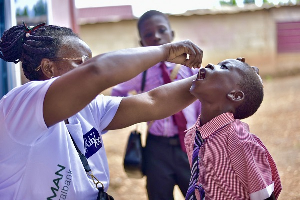 A child is getting receiving the Vitamin Supplement
A child is getting receiving the Vitamin Supplement
From 2 - 6 October 2024, Ghana embarked on a nationwide Integrated Measles-Rubella Vaccination and Vitamin A Supplementation Campaign targeting children between the ages of 9 months and 5 years.
With the Ghana Health Service (GHS) leading the effort, and with support from partners including WHO Ghana, the campaign sought to protect millions of children from measles, rubella improve their growth and development.
The Measles-Rubella (MR) vaccines, procured with support from Gavi, the Vaccine Alliance, were distributed across the country, with equity lens ensuring that no child was left behind, including those living in hard-to-reach areas.
Behind this successful initiative are the tireless efforts of health workers, volunteers, and community members, all driven by a shared commitment to safeguard the health of the next generation.
In Ada in the Greater Accra Region, a coastal district with many communities cut off from the mainland and reachable only by boat, health workers faced a unique challenge. With limited access to health services, these communities were a priority for the campaign. WHO teams, in partnership with local health workers, traveled by canoe to reach these remote settlements. It was a race against time, but the dedication of the teams ensured that children on these islands received the life-saving vaccines.
Local volunteers played a key role in helping health workers locate children in scattered households, guiding vaccinators across difficult terrain, and ensuring that no home was missed. "We are truly grateful for the vaccines and the dedication shown by the health workers. They didn’t give up until every single child was reached", said one community elder.
In Obuasi, a town known for its mining activity, the rains came down hard during the campaign. Roads became muddy, and some areas were nearly impassable. But the weather couldn’t dampen the determination of the vaccination teams. With umbrellas and raincoats, they braved the downpour, going from house to house, ensuring that children were not left unvaccinated.
A health worker spoke about her motivation. She said, "The rain was heavy, but it couldn’t stop us. These children needed protection, and we were determined to provide it, no matter the challenge."
One of the most inspiring aspects of the campaign was the willingness of community members to step up and support the health teams. In many regions, residents volunteered to assist vaccinators in navigating unfamiliar areas and helping to organize children for the vaccination process.
In Obuasi, it was the community's cooperation that helped overcome the difficult conditions caused by the rain, with locals providing shelter and support to vaccination teams.
To ensure that no child was left behind, supervisors from WHO Ghana and other partner organizations conducted Rapid Convenient Monitoring (RCM) throughout the campaign in already vaccinated geographies. The RCM provided real-time data, enabling health workers to quickly identify poorly covered areas and plan mop-up activities.
The teams went back into communities, checking records and knocking on doors to ensure that every eligible child received the Measles-Rubella vaccine and Vitamin A supplement. This meticulous approach, supported by WHO's technical assistance, ensured that the campaign achieved the desired coverage.
The success of Ghana’s Measles-Rubella Vaccination and Vitamin A supplementation campaign is a testament of the power of collaboration. From the dedication of health workers in the field to the support of community members and the technical guidance from WHO, every piece of the puzzle came together to protect the health of the country’s children.
Dr. Frank Lule, WHO Representative to Ghana, remarked, “This campaign has shown the power of partnership in action. Despite the challenges, health workers, local leaders, and volunteers came together with one goal: to protect the future of our children. This is what health equity looks like in practice.”
As the campaign closes, the impact will be felt for years to come. The children vaccinated this October are now better protected from the risks of measles and rubella, and the lessons learned from this campaign will inform future efforts to ensure that no child is ever left behind.